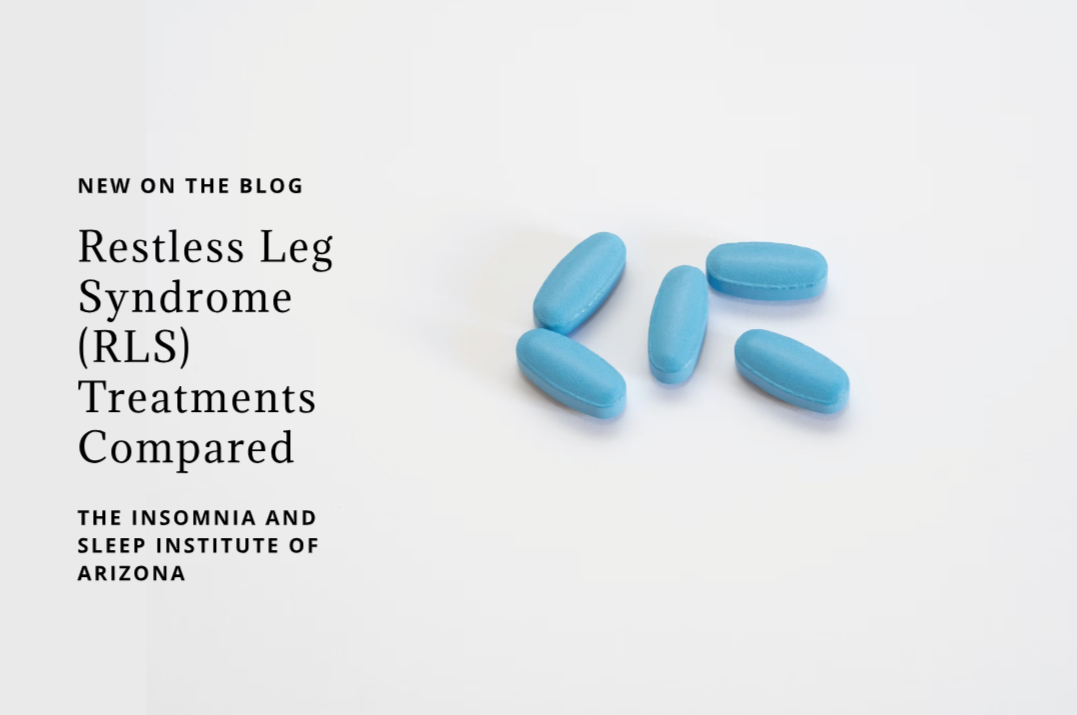Disclaimer: What follows is not meant as clinical advice. The appropriate treatment depends on the individual, and we recommend you contact us to set up an appointment with a board-certified somnologist if you are experiencing difficulty with RLS.
Overview
Studies run by different teams with different designs and patient populations can sometimes yield different results. This can be because of differences in researcher quality and it can also be due to differences in treatment length, dosage, severity of illness, etc. In order to address this problem in the case of RLS medications, a team of researchers systematically reviewed 46 restless leg syndrome (RLS) treatment trials that were conducted between 2004 and 2018[1]. These trials looked at 10 different drugs, including gabapentin, gabapentin enacarbil, ropinirole, rotigotine, pramipexole, iron, levodopa, pregabalin, cabergoline, and oxycodone-naloxone. Following is a summary of recommended best practices based on what came out of this review:
1. Gabapentin and pregabalin should be tried first
Gabapentin, gabapentin enacarbil, and pregabalin are first-line recommendations for clinicians in the treatment of RLS because they have shown consistent effectiveness vs. placebo, and they are less likely to cause augmentation (changing and returning, possible worsening of RLS symptoms) relative to other available drugs.
2. Iron supplements may help, but only if you’re low
For those with low iron levels, iron supplements can often alleviate RLS symptoms. The average reduction in RLS across the studies was 5.15 points on a 40-point scale (note that the difference between mild and severe RLS is 20 points on the same scale).
3. Levodopa may not work at all
Although early studies showed an effective treatment of Levodopa for RLS, subsequent studies have shown it to be ineffective. In totality, the body of evidence indicates it is generally not effective. The researchers speculate that perhaps the reason for the disparate findings may be study length. Whereas a short study may show it to be effective, longer use could lead to augmentation where the symptoms return but are altered in nature, generally yielding the same overall RLS score as before the treatment began, indicating no improvement. Another problem is the limited number of available studies of Levodopa for RLS.
4. Oxycodone-naloxone could help some individuals who don’t see a reduction in RLS symptoms with other drugs
There is only one study[2] that indicates that prolonged release of oxycodone-naloxone significantly relieved symptoms of RLS in patients who did not respond to other, more conventional treatments. We note, however, that opioids are highly addictive and can worsen sleep apnea. Therefore, prolonged release oxycodone-naloxone is assessed only as a last resort for second-line treatment in severe RLS patients.
5. Cabergoline, though not recommended due to side effects, appears to have the largest effect on RLS symptom reduction
Cabergoline was actually shown to be the most effective of all of the drugs evaluated in this review, but it must be noted that (a) cabergoline is generally not recommended for RLS patients due to the risk of side effects, including scarring of the lungs, and (b) there are really not very many trials that actually test cabergoline for RLS patients, so the evidence is not as strong as one would hope to see before trying a potentially dangerous drug.
Conclusions
The main takeaways are that (1) gabapentin and pregabalin should be recommended first, (2) iron supplements can help, but only for those who are low in iron, (3) levodopa probably doesn’t work at all, (4) oxycodone-naloxone could be considered for patients who didn’t see improvement from the recommended drugs, and (5) cabergoline, though shown to be the most effective drug, is not recommended due to risk of side effects (also note the sparsity of trials of the drug). These insights are not meant as clinical recommendations. A variety of factors, including existing medical conditions and drug interactions, can play a role in an individual patient’s treatment plan. If you suffer from RLS and it is degrading your quality of life, please see one of our board-certified sleep specialists.
Sources
- Zhou X, Du J, Liang Y, Dai C, Zhao L, Liu X, Tan C, Mo L, Chen L. The Efficacy and Safety of Pharmacological Treatments for Restless Legs Syndrome: Systemic Review and Network Meta-Analysis. Front Neurosci. 2021 Oct 26;15:751643. doi: 10.3389/fnins.2021.751643. PMID: 34764852; PMCID: PMC8576256.
- Trenkwalder C., Beneš H., Grote L., García-Borreguero D., Högl B., Hopp M., et al.. (2013). Prolonged release oxycodone-naloxone for treatment of severe restless legs syndrome after failure of previous treatment: a double-blind, randomised, placebo-controlled trial with an open-label extension. Lancet Neurol. 12, 1141–1150. 10.1016/S1474-4422(13)70239-4





